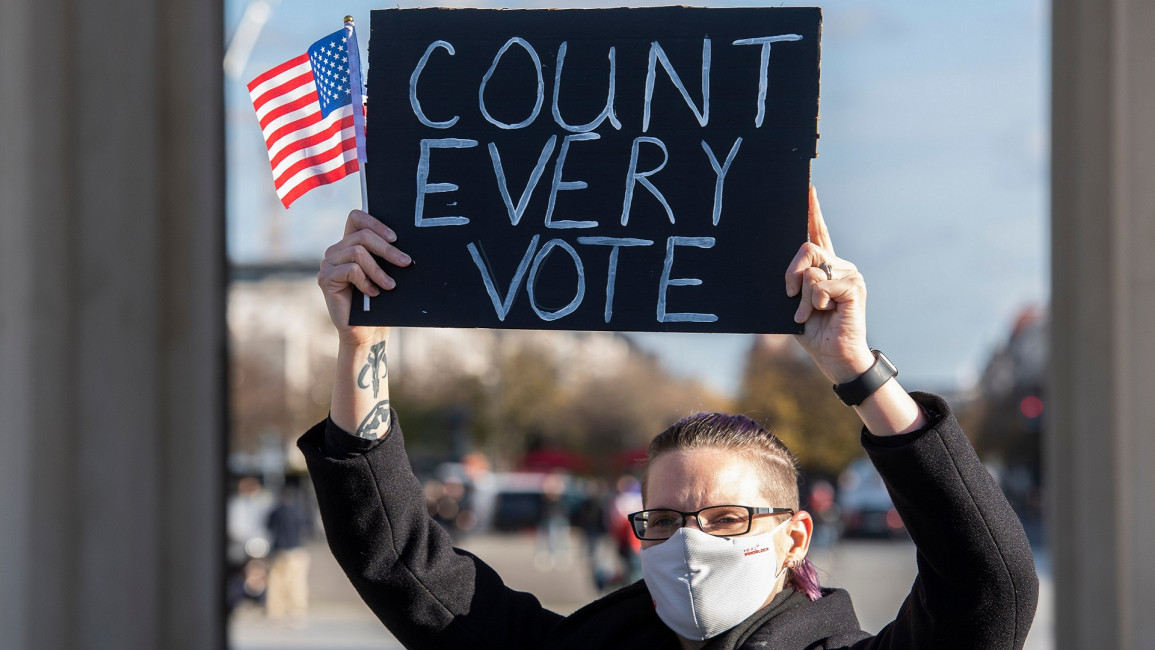Explainer: There’s no winner in the US presidential race but that's OK
The US woke up on Wednesday morning without a winner of the presidential election. That's OK.
Critical battleground states including Michigan, Wisconsin and Pennsylvania remained without declared winners, leaving both President Donald Trump and Democrat Joe Biden short of the 270 Electoral College votes needed to win the White House.
This isn't necessarily a surprise. In a year turned upside down by the coronavirus pandemic, many states made it easier to vote by mail, and millions chose to do so rather than venturing out to cast ballots in person. That meant a slowdown in the tabulation of results because votes received by mail often take longer to process than ballots cast at polling places.
And the closer the margin in a state is, the more votes are needed to declare a winner.
Read also: US elections – What we know so far
There are also roughly 20 states that allow ballots received after Election Day to be counted if they were postmarked by the day of the election. That includes Pennsylvania, one of the key outstanding states.
Some states, including Florida, began counting absentee ballots days before Election Day — and had definitive results within hours of the polls closing. The AP declared Trump the winner in Florida.
The abundance of absentee ballots also has thrown into doubt historical norms, making the arc of the race harder to determine — though one political narrative that held for sure is that the country remains evenly divided between both parties.
None of that means there is anything wrong with the results, or any reason to doubt the vote-counting process. It just means the country doesn't know who won the presidential election for the time being.
And we don't yet know when we'll know.
The delay doesn’t signify a positive for one side or the other — even though it has provoked radically different reactions from each.
Biden took an outdoor stage in Delaware shortly before 1 am local time (0600 GMT) on Wednesday and said the country needed more time to determine its next president, declaring, “Your patience is commendable.”
“We knew because of the unprecedented early vote, the mail-in vote, that it was going to take a while,” Biden said. “We’re going to have to be patient until the hard work of tallying the votes is finished, and it ain’t over until every vote is counted.”
Trump spent months railing against expanding mail-in voting and suggesting without evidence that it could lead to widespread fraud, while imploring with equal fervour that the election should have a result on the same night the polls closed. In the early morning hours of Wednesday, he told a crowd of cheering supporters at the White House that he would challenge the election results before the Supreme Court, though it was unclear exactly what type of legal challenge he was proposing.
That prompted a statement from Biden campaign manager Jen O'Malley Dillion, who said: "If the president makes good on his threat to go to court to try to prevent the proper tabulation of votes, we have legal teams standing by ready to deploy to resist that effort. And they will prevail.”
Vote tabulations routinely continue beyond Election Day, and states largely set the rules for when the count has to end.
The U.S. has endured a presidential race without an immediate winner before. In 2000, a Supreme Court ruling on Dec. 12 — two months and five days after Election Day — ended the Florida recount and awarded the presidency to Republican George W. Bush over Democrat Al Gore.
This time, media outlets frequently warned a delayed verdict could occur — suggesting that an election where campaigning was so disrupted wouldn't escape seeing its conclusion get scrambled as well.
Follow our live blog here
Follow us on Facebook, Twitter and Instagram to stay connected


![Trump's warm greeting to Netanyahu contrasted with Kamala Harris's critical reception [Getty]](/sites/default/files/styles/image_330x185/public/2024-07/GettyImages-2162908988.jpg?h=69f2b9d0&itok=OLc5dL88)
![The brutal assault on Khan Younis has killed dozens and displaced thousands more [Getty]](/sites/default/files/styles/image_330x185/public/2024-07/GettyImages-2162526709.jpg?h=d3eda8cf&itok=n5N-o8p5)
![Members of the Algerian delegation threw roses into the Seine [Getty]](/sites/default/files/styles/image_330x185/public/2024-07/GettyImages-2162980872.jpg?h=199d8c1f&itok=h_3o_TOL)